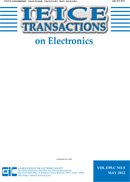Volume E99.C, Issue 6
Displaying 1-21 of 21 articles from this issue
- |<
- <
- 1
- >
- >|
Special Section on Analog Circuits and Related SoC Integration Technologies
-
2016 Volume E99.C Issue 6 Pages 604-605
Published: June 01, 2016
Released on J-STAGE: June 01, 2016
Download PDF (83K) -
Article type: INVITED PAPER
2016 Volume E99.C Issue 6 Pages 606-613
Published: June 01, 2016
Released on J-STAGE: June 01, 2016
Download PDF (4260K) -
Article type: INVITED PAPER
2016 Volume E99.C Issue 6 Pages 614-622
Published: June 01, 2016
Released on J-STAGE: June 01, 2016
Download PDF (3620K) -
Article type: PAPER
2016 Volume E99.C Issue 6 Pages 623-631
Published: June 01, 2016
Released on J-STAGE: June 01, 2016
Download PDF (714K) -
Article type: PAPER
2016 Volume E99.C Issue 6 Pages 632-640
Published: June 01, 2016
Released on J-STAGE: June 01, 2016
Download PDF (2056K) -
Article type: PAPER
2016 Volume E99.C Issue 6 Pages 641-650
Published: June 01, 2016
Released on J-STAGE: June 01, 2016
Download PDF (1670K) -
Article type: BRIEF PAPER
2016 Volume E99.C Issue 6 Pages 651-654
Published: June 01, 2016
Released on J-STAGE: June 01, 2016
Download PDF (1220K) -
Article type: BRIEF PAPER
2016 Volume E99.C Issue 6 Pages 655-658
Published: June 01, 2016
Released on J-STAGE: June 01, 2016
Download PDF (1067K) -
Article type: BRIEF PAPER
2016 Volume E99.C Issue 6 Pages 659-662
Published: June 01, 2016
Released on J-STAGE: June 01, 2016
Download PDF (1747K) -
Article type: BRIEF PAPER
2016 Volume E99.C Issue 6 Pages 663-666
Published: June 01, 2016
Released on J-STAGE: June 01, 2016
Download PDF (606K)
Special Section on Cutting-Edge Technologies of Superconducting Electronics
-
2016 Volume E99.C Issue 6 Pages 667-668
Published: June 01, 2016
Released on J-STAGE: June 01, 2016
Download PDF (64K) -
Article type: INVITED PAPER
2016 Volume E99.C Issue 6 Pages 669-675
Published: June 01, 2016
Released on J-STAGE: June 01, 2016
Download PDF (844K) -
Article type: INVITED PAPER
2016 Volume E99.C Issue 6 Pages 676-682
Published: June 01, 2016
Released on J-STAGE: June 01, 2016
Download PDF (1304K) -
Article type: INVITED PAPER
2016 Volume E99.C Issue 6 Pages 683-691
Published: June 01, 2016
Released on J-STAGE: June 01, 2016
Download PDF (4910K) -
Article type: PAPER
2016 Volume E99.C Issue 6 Pages 692-696
Published: June 01, 2016
Released on J-STAGE: June 01, 2016
Download PDF (1559K) -
Article type: PAPER
2016 Volume E99.C Issue 6 Pages 697-702
Published: June 01, 2016
Released on J-STAGE: June 01, 2016
Download PDF (2144K) -
Article type: PAPER
2016 Volume E99.C Issue 6 Pages 703-709
Published: June 01, 2016
Released on J-STAGE: June 01, 2016
Download PDF (484K) -
Article type: PAPER
2016 Volume E99.C Issue 6 Pages 710-716
Published: June 01, 2016
Released on J-STAGE: June 01, 2016
Download PDF (3442K)
Regular Section
-
Article type: PAPER
Subject area: Integrated Electronics
2016 Volume E99.C Issue 6 Pages 717-726
Published: June 01, 2016
Released on J-STAGE: June 01, 2016
Download PDF (1789K) -
Article type: BRIEF PAPER
Subject area: Electronic Circuits
2016 Volume E99.C Issue 6 Pages 727-729
Published: June 01, 2016
Released on J-STAGE: June 01, 2016
Download PDF (385K) -
Article type: BRIEF PAPER
Subject area: Semiconductor Materials and Devices
2016 Volume E99.C Issue 6 Pages 730-733
Published: June 01, 2016
Released on J-STAGE: June 01, 2016
Download PDF (973K)
- |<
- <
- 1
- >
- >|
